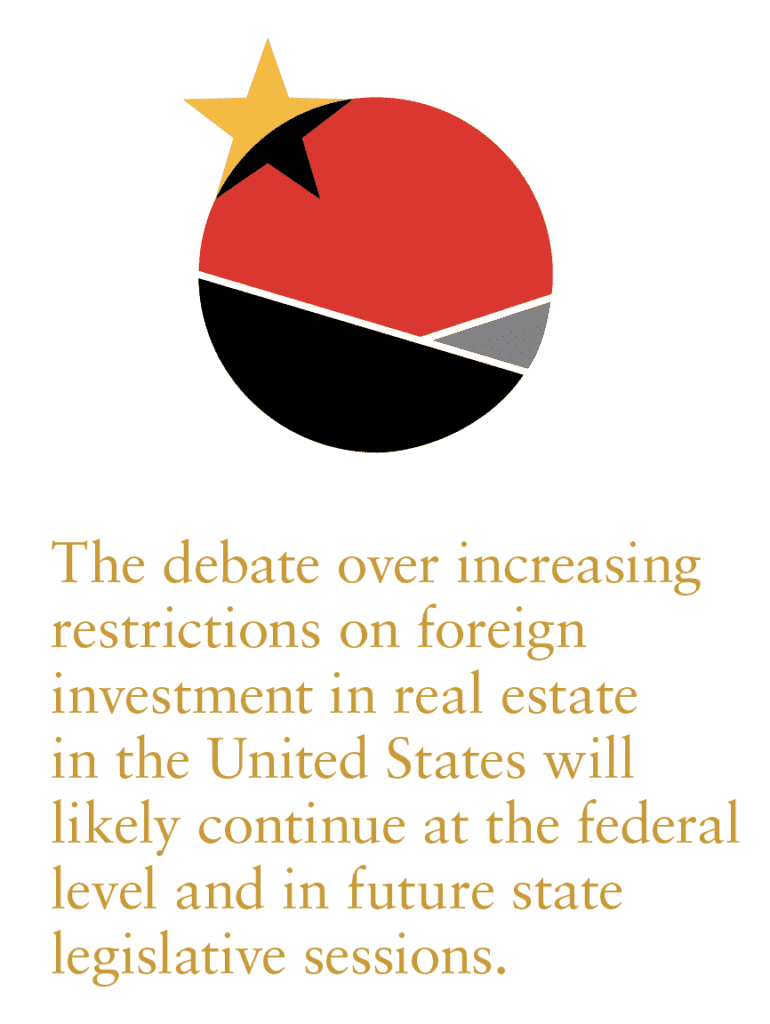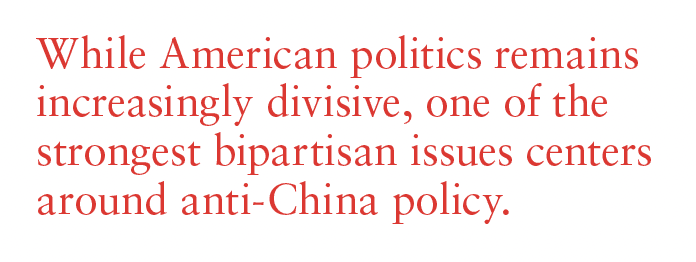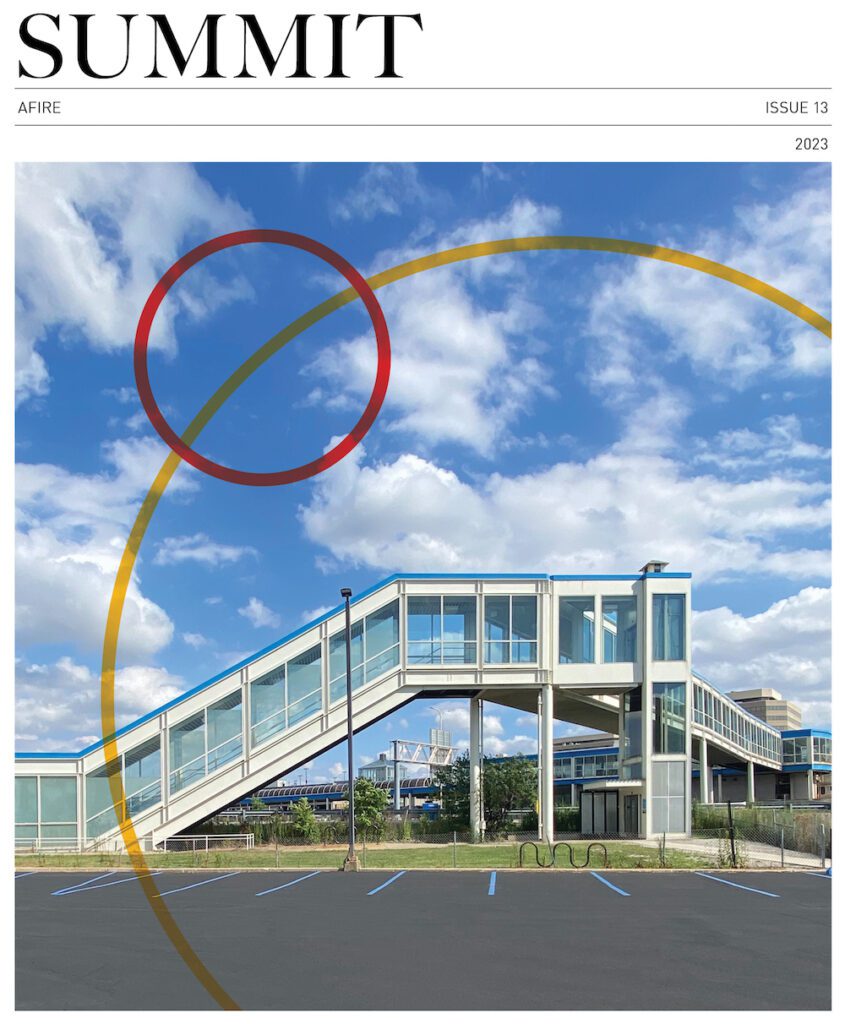Growing anti-China sentiment is largely driving the policy discussion around foreign investment in US real estate—particularly Chinese-ownership, transactions involving farmland, and overall national security interests.
Unlike many countries, the United States has generally remained open for investment in US real estate by foreign owned entities, albeit with some government oversight.
The primary regulatory hurdle has long been the Committee on Foreign Investments in the United States (CFIUS), a federal interagency committee with a relatively narrow scope of review related to national security interests.
Additionally, the Agricultural Foreign Investment Disclosure Act of 1978 (AFIDA)1 requires increased transparency for transactions related to agricultural land in particular.
As discussed below, growing anti-China sentiment is largely driving the policy discussion around foreign investment in US real estate, particularly Chinese-ownership, transactions involving farmland, and overall national security interests.
BACKGROUND ON CFIUS
Originally established by executive order in 1975 to study foreign investment, CFIUS’s authority has expanded over time and now includes the coordination of several departments and agencies, along with White House offices as needed, such as the National Security Council and the National Economic Council. Certain real estate transactions are reviewed by CFIUS if they pose a potential national security risk, in which case, CFIUS may seek agreement with the parties to the transaction to mitigate any risk to the US government.

Under 31 C.F.R. Part 802,2 CFIUS has jurisdiction over real estate purchases by foreign investors in proximity to specific maritime ports, airports, and military installations. Additionally, AFIDA requires foreign investors who purchase, transfer, or hold agricultural land to file a report with the US Secretary of Agriculture within 90 days following the transaction. These filings are compiled by the Farm Service Agency (FSA) into an annual report to Congress, which is also publicly available on the FSA website, essentially providing a national database of foreign ownership of agricultural land.
In addition to CFIUS and AFIDA, real estate transactions by foreign investors are subject to federal reporting requirements under various tax, antitrust, and immigration laws, as well as export control rules and regulations. States also have extensive reporting requirements for real estate transactions by foreign persons, much like the federal requirements under AFIDA.
In 2022, Fufeng USA, a subsidiary of a Chinese company, purchased 370 acres of land in Grand Forks,3 North Dakota. Federal and state legislators, as well as the Air Force, criticized the purchase due to the land’s proximity to Grand Forks Air Force Base, home to military drone technology research and a space networking center. However, CFIUS determined, somewhat controversially, that it lacked jurisdiction to review the transaction.
The Fufeng purchase, along with heightened national security concerns about foreign investment generally, has sparked a widespread response to restrict the purchase of certain real estate by foreign investors. While this response includes both federal and state actions, the more aggressive policy proposals have occurred at the state level.
Following the Fufeng purchase, CFIUS issued a proposed rule4 to add eight military installations to the current list of applicable US Government sites. Further, several Members of Congress have introduced legislation to prohibit the purchase of real estate by foreign persons and entities, a legislative response that spans both parties and both chambers of Congress. For example, in the Senate, Senator Tom Cotton (R-AR) introduced the Not One More Inch or Acre Act,5 which would prohibit the purchase of real estate in the US by Chinese citizens or entities.
Bipartisan proposals include the PASS Act,6 which is sponsored by Senators Mike Rounds (R-SD) and John Tester (D-MT) and would specifically restrict the purchase of agricultural companies and land by Chinese, Russian, Iranian, and North Korean foreign persons and entities. In the House, Representative Elise Stefanik (R-NY-21), a member of House leadership, and Representative Rick Crawford (R-AR-01) introduced the Agricultural Foreign Investment Transparency Act7 to update AFIDA and expand oversight of agricultural land purchased by foreign persons.
In addition to introducing standalone bills, Members have also proposed amendments to must-pass legislation, such as the National Defense Authorization Act (NDAA), to address foreign investment in US real estate. For example, Senator James Lankford (R-OK) has introduced an amendment to the NDAA to include the SOIL Act,8 which would expand the scope of transactions reviewed by CFIUS.
STATE ACTIONS
There has been a flurry of state action on foreign ownership of real estate this year. Thirteen legislatures have enacted laws to limit the foreign purchase and ownership of real estate, particularly agricultural land and land in proximity to military facilities.
Some states have targeted persons and entities from specific countries. For example, Florida,9 Indiana,10 Louisiana,11 and North Dakota12 prohibit the purchase of certain types of land by persons and entities from identified countries such as China, Iran, North Korea, and Russia.

At the time of this writing, there are 32 bills with similar restrictions pending in 13 state legislatures. 56 similar bills were introduced but failed to pass in 19 state legislatures before they adjourned, making them ripe for consideration in future legislative sessions.
It is critical to understand the political context in which these federal and state policies are proposed. While American politics remains increasingly divisive, one of the strongest bipartisan issues centers around anti-China policy, creating common ground among strange bedfellows, from “America First” nationalists to national security hawks to progressive populists.
The debate is wide-ranging, from military readiness and access to critical minerals, to domestic production and human rights protections. For example, last year, Congress and the Biden Administration worked together to enact the Chips and Science Act13 in an effort to improve American competitiveness against China and promote domestic semiconductor production, with Senate Majority Leader Chuck Schumer (D-NY) already pledging a second installment of China-competitiveness legislation. Mounting concern over China’s human rights abuses, particularly Uyghur forced labor in the Xinjiang province, culminated in the passage of the Uyghur Forced Labor Prevention Act,14 which imposes sanctions and import restrictions related to the items produced in the region.
Bipartisan outrage ensued as a Chinese spy balloon flew over the United States, ultimately being shot down at the direction of President Biden and delaying Secretary of State Antony Blinken’s impending trip to China. Indeed, one of the first bipartisan acts at the start of the 118th Congress was the formation of the Select Committee on the Chinese Communist Party, whose self-purported mission is to “build consensus on the threat posed by the Chinese Communist Party and develop a plan of action to defend the American people, our economy, and our values.”
PLANNING FOR FUTURE CHANGES
Ultimately, the policies proposed today become campaign messaging tomorrow. Based on Congress’ track record thus far, as the 2024 presidential election cycle heats up, so will the anti-China rhetoric. Accordingly, the debate over increasing restrictions on foreign investment in real estate in the United States will likely continue at the federal level and in future state legislative sessions. Moreover, legal challenges may arise as some state laws may be preempted by CFIUS.
Foreign investors in US real estate should be mindful of this rapidly evolving legal landscape and opportunities to engage in this policy debate.
IN THIS ISSUE

NOTE FROM THE EDITOR: WELCOME TO #13
Benjamin van Loon | AFIRE
OFFICE TROUBLES: FINANCIAL RISKS AND INVESTING OPPORTUNITIES IN US CRE
Dr Alexis Crow | PwC + Byron Carlock
THE UNDERPERFORMANCE PARADOX: WHY INDIVIDUAL INVESTORS FALL BEHIND DESPITE BUYING LOW
Ron Bekkerman | Cherre + Donal Ward | Tenney 101
CLIMATE THREAT: EXTREME WEATHER IS THE NEW NORMAL FOR REAL ESTATE
Jacques Gordon, PhD | MIT
CLIMATE OPPORTUNITY AWAITS: HOW REAL ESTATE CAN INVEST IN CLIMATE ADAPTATION
Michael Ferrari, PhD and Parag Khanna, PhD | Climate Alpha
PREMIUM PRICE TAGS: INSURABILITY THROUGH PROPERTY RESILIENCE DATA
Bob Geiger | Partner Engineering & Science
REAL ESTATE WEB3: THE EMPEROR’S NEW CLOTHES OR THE NEXT BIG THING?
Zhengzheng Tan, Alice Guo, and Naveem Arunachalam | MIT
ADAPTIVE TO REUSE: COULD BUILDING CONVERSIONS BE DIFFICULT, EXPENSIVE . . . AND STILL PROFITABLE?
Josh Benaim | Aria
RENOVATE, REBRAND, REPOSITION: ADDING VALUE TO MULTIFAMILY THROUGH REVITALIZATION
Robert Kilroy, CFA | The Dermot Company + Will McIntosh, PhD | Affinius Capital
REDEFINING THE PROGRAM: A CONVERSATION WITH ARCHITECT DAVID THEODORE
Peter Grey-Wolf | Wealthcap + David Theodore | McGill University
SENIOR HOUSING UPDATE: EMERGING OPPORTUNITIES THROUGH DEMOGRAPHIC TAILWINDS AND DIMINISHING SUPPLY OUTLOOK
Robb Chapin, Jack Robinson, Andrew Ahmadi, and Morgan Zollinger | Bridge Investment Group
SENIOR HOUSING UPDATE: UNPRECEDENTED DEMOGRAPHIC ACCELERATION MAY DRIVE STRONG OPERATING FUNDAMENTALS AMID ECONOMIC SLOWDOWN
Tom Errath | Harrison Street
HOLIDAY FROM HISTORY: REASONS FOR US OPTIMISM IN A CHANGING GLOBAL ENVIRONMENT
Charlie Smith | Newmark
CRADLE TO CRADLE: AN ALLOCATOR’S VIEW ON IMPLEMENTING ESG INITIATIVES
Christopher Muoio and Katie Cappola | Madison International Realty
FREE LUNCH: MULTI-DIMENSIONAL DIVERSIFICATION IS A FULL-COURSE FREE MEAL
Elchanan Rosenheim and Tali Hadari | Profimex
CAMPAIGN MESSAGING: CFIUS, AFIDA, AND EXPANDING FEDERAL AND STATE RESTRICTIONS ON FOREIGN INVESTMENT IN US REAL ESTATE
Caren Street, John Thoms, and Anya Ram | Squire Patton Boggs

—
ABOUT THE AUTHORS
Caren Street is a Principal in the Public Policy Practice Group; John Thomas leads the Real Estate Practice; and Anya Bharat Ram served as a 2023 summer at Squire Patton Boggs.
—
NOTES
1. Agricultural Foreign Investment Disclosure Act of 1978 [Public Law 95-460] [as amended through P.L. 110–246, effective May 22, 2008] [7 U.S.C. §§ 3501-3508]
2. Regulations Pertaining to Certain Transactions by Foreign Persons Involving Real Estate in the United States, 31 C.F.R. Part 802 (2020)
3. CFIUS Determines it Lacks Jurisdiction to Review Chinese Land Acquisition, Trade Practitioner Blog on June 26, 2023
4. Provisions Pertaining to Certain Transactions by Foreign Persons Involving Real Estate in the United States, 88 Fed. Reg. 29003 (proposed May 5, 2023) (to be codified at 31 C.F.R. pt. 802)
5. Not One More Inch or Acre Act, S. 1136, 118th Cong. § 2 (2023)
6. PASS Act of 2023, S. 168, 118th Cong. § 2 (2023)
7. Agriculture Foreign Investment Transparency Act, H.R. 9483, 117th Cong. § 2 (2022)
8. SOIL Act of 2023, S. 1066, 118th Cong. §§ 2-3 (2023
9. Florida CS/CS/SB 264
10. 2023 Indiana Senate Enrolled Act No. 477 §§ 1-4
11. Louisiana House Bill No. 125 § 3613
12. North Dakota Senate Bill No. 2371 §§ 1-5 (2023)
13. Chips and Science Act, Pub. L. No. 117-80, 117th Cong. (2022)
14. Uyghur Forced Labor Prevention Act, Pub. L. No. 117-78, 117th Congress (2021)
—
THIS ISSUE OF SUMMIT JOURNAL IS PROUDLY UNDERWRITTEN BY

For more than 20 years, Yardi has developed real estate investment management software that helps managers of global assets valued at trillions of dollars make informed investment decisions. Yardi Investment Suite clients include many of the world’s premier investment management funds, start-ups and partnerships of all types and sizes.
Real estate investments grow on Yardi. That’s because the Yardi Investment Suite automates complex investment management processes and provides full transparency, from the investor to the asset. Through interactive dashboards, investors can view documents and have access to reports and metrics. Collaboration is easy when your advisor or accountant is given access to view your accounts, reducing the need for emailing sensitive information.
The Yardi Investment Suite leads the real estate industry through innovation and value with fully integrated investment management, property management and accounting functionality. Fund managers and their customers can manage assets with superior efficiency and ease. Learn more.

